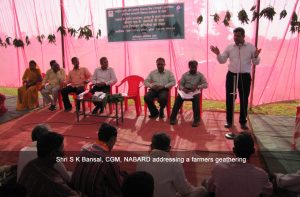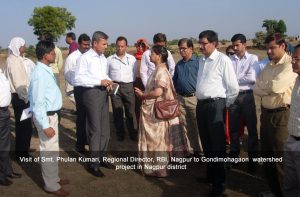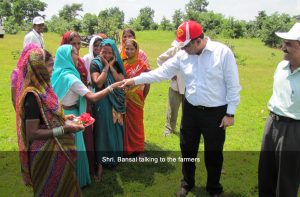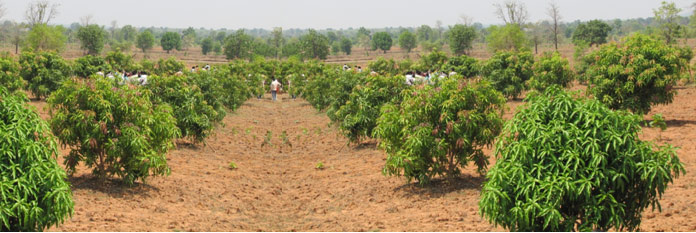Tribal Development Fund Projects (TDF)



ACTIVITIES OF THE TRUST
MAJOR ACTIVITIES UNDERTAKEN BY THE TRUST DURING THE YEAR:
I. NABARD Supported Projects
2. Tribal Development Fund Projects (TDF):

TDF/Wadi project / Programme is one of the most popular developmental programmes of NABARD. Under Wadi or TDF programme / project, tribal families are supported for developing one acre orchard in waste / dry land owned by them. Along with support for horticulture, the families are also supported for soil conservation, water resource development, development of improved and sustainable agriculture, support to landless families, health, women development, training and capacity building etc. In other words, this is a developmental programme with a holistic approach.
Since inception, 16 Wadi projects are being implemented by the Trust in three state of central India i.e. Maharashtra (7), Madhya Pradesh (5) and Chhattisgarh (4). Out of 16 projects, one TDF project TDF-Tamia (Old) has been completed in March 2016, two projects that of Nagpur and Amravati-I has been completed in March 2017 and Five TDF project that of Amravati Additional, Kurkheda, Chhuriya-I, Tamia EI and TDF- Bhainsdehi have been completed in March-2018. The details of sanction and number of Wadis established under each project are as under;

Tribal development is one of the chief objectives of NCT. Tribal does live mostly in geographically tough and remote areas of our country and the features of which are hilly and undulating. Due to the geographical features and remoteness of tribal areas, they are inaccessible to modern technology, government development schemes and other benefits like healthcare, education, women empowerment etc. In spite of reasonably good rainfall, agriculture is poor as there are no water conservation facilities and hence the rain water runs off down the hills. This forces breadwinning members of the tribal families to migrate to adjacent towns and cities in search of livelihood. In the absence of these family members, the women, children and elderly members who are left back in the villages are put to lot of inconvenience. Women are especially badly hit as they have to take up responsibility of the family, walk long distances in search of potable water, work at home in congested and unhygienic condition, work in fields and face drudgery of daily life. Agriculture is neglected and hence yield is too poor to meet the needs of the families.
Nageshwara Charitable Trust is working for the benefit of Tribal community since its inception. It is one of the main objectives of the Trust. Over a long period, the Trust has implemented several employment generations, income generation programmes / projects for the Tribal community in 3 states of Maharashtra, Madhya Pradesh and Chhattisgarh. NABARD sponsored project is one of the biggest programmes being implemented by the Trust. The Trust has started this initiative since 2009.
NCT has implemented various innovative initiatives within the NABARD supported Tribal Development Programme for successful implementation of the programme. It is observed from the experience of the Trust that there are 5 major activities / factors which have positive impact on success of Wadiprogramme as follows:
1. Proper Trench and Pit making:

Technically, proper pit is required for overall growth of any horticulture plant. NCT made it a point that all farmers make proper pits of size 41”x 41”x 41”, which is just over the standard size of 1M x 1M x 1M. NCT also propagates and ensures even size for any horticulture variety such as Mango, Guava, Lime, Awla or for Custard apple. This is to make sure that the farmers will n o t n e g l e c t t h e 2 n d horticulture crop. Normally, it is observed that Tribal farmers take good care of Mango and give step-motherly treatment to the 2nd or 3rd horticulture crop, in spite of the fact that they are also equally important for him to fetch better and continuous income throughout the year. It is also technically proven that proper contour trenches have a highly positive effect on survival of horticulture plants. Also due to improved and increased soil moisture, the beneficiaries can easily go for Rabi intercropping, which fetch an additional income to the family. NCT propagates digging of trenches first and then the pit because farmers can keep the top soil of the trench separately and use the same for filling the pit and use the bad or stony soil as bunds for the trenches. NCT ensures that 60 trenches of size 8’x 2′ x 2′ be made just 6 feet above the pit. These 60 trenches have the capacity to conserve over 8 Lac liters of water during the 3 months rainy season. Due to this huge conservation of water in one acre of land, the moisture content of the soil is maintained up to Feb-March. Very interestingly, it is observed that, any beneficiary who has completed 100% trench and pit as per prescribed dimension, have taken care of their Wadis properly. At the same time, the farmers who have not fully completed the trenches and pits have neglected the wadis and some of them have migrated, in spite of strong efforts by the project implementation team. It clearly shows that 100% trench and pit making is a “once in a life time” activity and very tough to achieve. Once it is done properly, the farmers normally take care of their Wadis as they do not want their efforts to go waste. Hence, NCT ensures that all farmers dig the trenches of 8ft X 2 ft x 2 ft and pit of size 41″x
2. Proper fencing for protection of Wadis:

proper fencing is required to protect the Wadis from stray animals. Since last 3 years, NCT is successfully convincing the farmers to convert the amount available as labour charges into purchase of barbed wire for fencing. Even farmers are willing to put in a little money as the amount available as labour charges is not sufficient. Barbed wire fencing has not only helped in protection of the Wadis, but also has helped in building the much required confidence amongst the farmers to take up the Wadi maintenance as in Horticulture crops the benefit is seen only after 4-5 years.
3. Use of Amrutpani and Gomutra+Milk spray:

This is a very simple organic treatment, which costs nothing to the farmers. NCT has inculcated the habit of application of Amrutpani (cow dung and cow urine is mixed and with the help of little jaggery, the mixture is fermented for 4 days to increase micro organisms) once in every 5 days. It is observed that, the growth and health of plants of those farmers who regularly use Amrutpani is excellent and even in summer, these wadis have survived with very less water. Regular spray of Cow Urine and Fresh cow milk (50ml each in 15 lit of water) has helped in proper growth and health of plants. Spraying Cow urine keeps pests and disease away and spraying cow milk increases photosynthesis. These two simple, organic, no cost treatments have helped in better survival and good growth of Wadi plantation.
4. Proper use of FYM, micronutrients and organic growth agents:

Over a period of time and through experience, it is learnt that use of Farm – Yard – Manures , micronutrients and organic growth agents have helped in proper growth and good survival of Wadi plantation. Hence, proper care is taken in minimum 2 times application of FYM, use of micronutrients both in the form of soil application as well as spray application; use of organic growth agents is being adopted for better growth of Wadi plants.
5. Community mobilization and empowerment of Village Planning Committees: Community mobilization or involvement of community in project implementation is the key to the success of any project. Keeping this in mind, as per NABARD guidelines, NCT has promoted Village Planning Committees (VPCs) in all project villages of all TDF projects. Combining all VPCs, a Project Planning Committee (PPC) has also been formed. Proper training has been given to the members of both, VPC and PPC. NCT intends to convert. all PPCs into Farmer Producers Organizations (FPOs) by the time the TDF project reaches between 4-5 years of project implementation.
Other Innovative activities under TDF projects: Various innovative initiatives have been supported by the Trust under all the TDF projects being implemented. Some of them are as under;
a) Adoption of SRI method in rice cultivation:

NCT has created substantial awareness in this regard in the wadi beneficiary farmers, mainly in Rajnandgaon in Chhattisgarh state and Gondia&Gadchiroli district of Maharashtra state, both of which are Naxalite affected districts. In both Rajnandgaon and Gadchiroli (adjacent districts), rice is the major crop. NCT is propagating SRI method of rice cultivation since 2011. NABARD through NCT have supported to farmers for adopting SRI method of rice cultivation through model plots or low cost loan. This intervention has been a great success in project villages of TDF projects of Chhuriyain Rajnandgaon and Korchi and Kurkheda in Gadchiroli and Deori in Gondiadistrict. The average rice yield has increased from 12-15 quintals per acre to 20-25 quintals per acre, in spite of heavy rains during the monsoon season.This intervention has raised the confidence of farmers as they have, on an average gained about Rs. 10-15 thousand extra in one acre of rice cultivation. In Chhuriya, all the 14 VPCs have come forward and formed their PPC then onverted in to Farmer Producer Organization (FPO). This FPO is functioning and encouraging farmers for Paddy cultivating farmers using SRI method. FPO are procuring paddy and marketing Jai Shri Ram Rice under their own brand name in 10Kg and 25 Kg bags.
b) Implementation of TDF Projects through bank transfer of funds to Village planning committee accounts: NABARD as well as Government of India, insists upon direct transfer of funds to the bank account of beneficiaries. Taking the initiative forward, the Trust transfers major portion of grant amount sanctioned by NABARD into the bank account of respective Village Planning Committee (VPC) accounts. The major activities covered are that of Water Resource Development (WRD), landless support etc. This has helped in maintaining transparency in project implementation. This process has also enhanced the involvement of the beneficiaries and committee members in project implementation. The Trust has evolved an innovative system for approving the activity and proper monitoring and documentation, after transfer of funds in to VPC’s account.
c) Introduction of TERI developed improved cook-stove:

As per NABARD’s sanction of TDF projects, NCT supports each tribal family with a smokeless chulha (stove), which helps the women members of the family to overcome drudgery. Normally, a low cost chulha is made of cement, grit and sand. During the year The Energy Research Institute (TERI), New Delhi approached NCT for introducing low cost, improved cook-stoves, which operate on simple technique and are very easy to install. These cook-stoves save ¾ of fire wood and at the same time provide clean energy. The food cooked using this stove is much cleaner and tastier. NCT introduced this type of cook-stoves in NABARD supported all TDF projects.
d) Mandav Model for vegetable cultivation:

Enhancing the income of tribal families from intercropping in wadis is an important intervention in Wadiprojects.NCT has introduced / trained the farmers in various types of intercropping such as cereals, chili cultivation, vegetable cultivation using mandav (two-tier) model etc. The mandav model tried at TDF Tamia expansion I project has given good returns to the wadi beneficiaries. They have developed a two tier vegetable cultivation model in which creeper vegetables are grown on the ‘mandav ‘and spices / herbs such as Ginger, turmeric are grown under the Mandav. This model resulted in good returns to the tribal wadi beneficiaries. Farmers are earning 10-15 thousand during Kharif and Rabi season.
